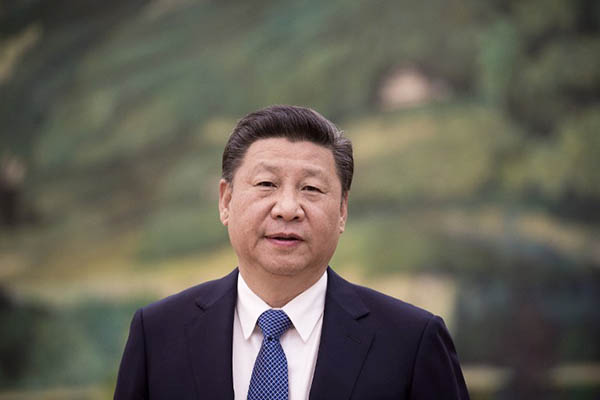
File photo of Xi Jinping. Nicolas Asfouri—AFP
A new book examining China’s economic success reveals the dramatic rise of Xi Jinping from the son of a revolutionary to the head of state
China would have gone the Soviet way had it not changed 40 years ago and initiated economic reforms and liberalized its trade policies. Prior to that, China under Mao Zedong was typical of the “revolutionary” states maintaining policies that kept the economy very poor, stagnant, centrally controlled, vastly inefficient, and relatively isolated from the global economy. What we have now is a consequence of the post-Mao “counter-revolution” under Den Xiaoping that elevated China to a superpower. Today, it has achieved another milestone: the leadership of a low-key honest man, Xi Jinping.
“Since opening up to foreign trade and investment and implementing free-market reforms in 1979, China has been among the world’s fastest-growing economies, with real annual gross domestic product growth averaging 9.5% through 2018, a pace described by the World Bank as the fastest sustained expansion by a major economy in history,” reads the preamble to a report issued by the U.S. Congressional Research Service.
China’s rise as a power to challenge “superpower” America is these days credited to Xi Jinping, who has led the country since 2013 and was in 2016 elected to a Communist Party “core leader”—an honor previously bestowed upon Mao Zedong and Deng Xiaoping. Ali Mahmood’s new book, Enter the Dragon: The Story of the China Miracle, claims Xi Jinping’s lofty status isn’t solely a result of his professional deftness and sharp mind; he also has something rare in a world of power struggles: unshakeable honesty.
Jinping’s father Xi Zhongxun was a “revolutionary leader” who became Vice-Premier of China but fell when “father of the revolution” Mao Zedong shifted his patronage, throwing him into two decades of obscurity. He was saved by succeeding leader Deng Xiaoping from “two death sentences and a seven-year prison term.” He died in 2002, leaving only $130 for his son, who grew up learning the ropes of power as both “prince and pauper” while belonging to one of the top revolutionary families of China. This life of extremes exposed young Xi Jinping to tough choices; but he came out of it as a man of remarkable integrity.
Xi Jinping studied engineering at the Tsinghua University, tried to join the Communist Party but was rejected nine times due to his family history and his father’s political ouster. Xi persisted and was finally accepted into the party in 1973 on his 10th attempt. By 1978, Mao was dead, and his father got him a job as secretary to an important party leader, “giving him a foundation in the military which would serve him throughout his political life.” In 1982, he decided to move back to civilian life while continuing his studies, and earned a doctorate in law.
Jinping’s early career was spent in the provinces, where he was loved by all who got to know him. In Fujian, he spent 16 years and married his second wife, the beautiful Peng Liyuan, a celebrity singer in China, which made Xi less obscure than he would have been otherwise. Fujian was haunted by notorious Lai Changxing, the founder of the Yuanhua business group running his shady empire from the special Economic Zone of Xiamen. Lai was the Al Capone of China, whose smuggling operations covered cars, cigarettes and one-sixth of China’s total oil imports.
In the 1990s, when smuggling giant Lai’s career was at its height, Xi was the governor of Fujian. Alone among all the officials in this era of crime, Xi retained his reputation for honesty. He was not interested in wealth or high life; he was also incorruptible. Lai finally fled to Vancouver where he became China’s most wanted criminal. After a long negotiation, he was extradited back to China on the condition that he would not be executed.
Xi then moved from Fujian to Zhejiang where he served as party boss for four years between 2002 and 2007. Two important changes set the tone for this period: China’s entry into the World Trade Organization and the Party’s opening of its doors to business entrepreneurs. Xi led the province through a time of fast economic uplift, while the business community contributed to growth. He supported local businesses that went on to become international names such as Alibaba, and carmaker Geely. Zhejiang exports rose by 33 percent annually for each of the four years of Xi’s governance.
In 2007, Xi was the sixth of the nine leaders to walk onto the stage to show the world the new Chinese pecking order. Top leader Keqiang was now down to seventh, showing that Xi had emerged as the clear favorite to succeed to the top at the 18th party Congress on Nov. 26, 2012. Xi was a clear frontrunner with Li Keqiang as his Premier; but an upset was always possible. Yet, on Sept. 28, 2012, his rival was expelled from the Communist Party following the scandal of businessman Neil Heywood’s murder, police Chief Wang’s flight to the U.S. consulate to seek asylum and the explosive events in Chongqing.
Luck had once more favored Xi and his long journey to the top of China’s political pyramid finally reached fruition in 2013; Xi was announced President of China, Secretary General of the Chinese Communist Party and Chairman of the Central Military Commission.
